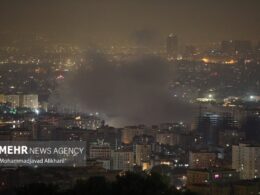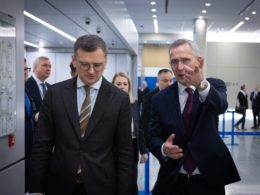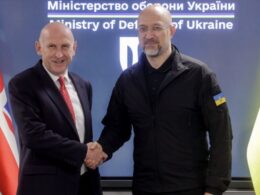Kurt Volker, former US Ambassador to NATO and Special Representative for Ukraine Negotiations (2017-2019), has been a key figure in US-Ukraine relations and a staunch advocate for Ukraine amid Russia's aggression.
Euromaidan Press editor Bohdan Ben interviewed Volker ahead of NATO's 75th summit in Washington (9-11 July), where Ukraine's potential membership is a central topic. As NATO members debate terms like "bridge to NATO" or "irreversible path" to membership — notably avoiding the word "invitation" — questions arise about the message this sends to Putin.
In this interview, Volker argues for a more assertive Western approach to supporting Ukraine. He advocates for a comprehensive strategy encompassing unrestricted weapons provision, direct protection of Ukrainian civilians and infrastructure, and a focus on economic recovery alongside military aid. Volker also proposes bold initiatives, including a $500 billion lend-lease program and immediate NATO membership for Ukraine.
A video version of the interview is also available.
B.B.: You've written about Ukraine's road to victory. In the context of this defensive war, how do you define a successful outcome for Ukraine?
K.V.: I think that Ukraine will win, and the West will help Ukraine win. But we are not completely there yet. The West is still being excessively cautious, is too concerned about escalation, and is not putting all the tools on the table that we should.
The West is still excessively cautious, is too concerned about escalation, and is not putting all the tools on the table that we should.
Kurt Volker
I think a comprehensive strategy for helping Ukraine win the war should first be military. We should provide the weapons that Ukraine needs and lift restrictions on their use because Ukraine is fighting for its self-defense.
The only restriction should be international law itself, which gives Ukraine the right to self-defense and requires hitting only military targets, not civilian targets. However, no further restrictions should be applied.
The second is that we should help Ukraine, particularly by protecting civilians, cities, civilian infrastructure, and economic production sources. These are things that we did to help Israel recently. There's no reason we cannot also help Ukraine directly with air defense. And if we do, it'll free up Ukrainian resources to have further protection in the east, where the front lines are. It will also give greater confidence to investors who may want to invest in rebuilding Ukraine's economy.
There's no reason we cannot also help Ukraine directly with air defense.
Kurt Volker
Third, we need to see that economic recovery and economic development are part of the strategy for victory. It's not something that waits until the end of the war; it's something we have to do now.
Finally, NATO membership for Ukraine is also part of the strategy for victory. We have to make sure that Ukraine gets an invitation to join NATO as soon as possible because this will send a clear signal to Putin that he's never going to win, never going to destroy Ukraine. The West will be there to help. As a result, it's time to end the war. Those are the many things we could be doing that we are not doing so far.
B.B.: You brought up this issue of NATO invitation. And for Ukrainians, it's really frustrating that NATO is afraid to provide its invitation, even if conditional, which would not mean NATO on-the-ground participation in the current war. What do you think about this?
K.V.: It's a very difficult question to answer, but we must answer it. If we tell Vladimir Putin that Ukraine cannot join NATO until after the war, then that's a message to Putin to continue the war. And we want the opposite. We want him to end the war.
So, we must figure out how to bring Ukraine into NATO as soon as possible.
Now, what people are worried about, and President Biden is worried about, is that NATO countries have to join the war against Russia immediately because of the NATO Article 5 collective defense. So, if Ukraine is being attacked, then we all have to fight back against Russia. And that could escalate into a wider NATO-Russia war and even escalate to the use of nuclear weapons. But we have to address this question. We can't ignore it or walk away and hope for the best.
We have to sit down together with Ukraine. We have to talk about what is needed for Ukraine's defense. We have to be clear about what we're willing to do, such as help with air defenses, help with freedom of navigation in the Black Sea, training, equipment, ammunition, and everything that Ukraine needs. And Ukraine needs to make clear that, at this stage, there's no requirement for Western troops to be fighting on the front line. Ukraine just needs the equipment, the ammunition, and the support. And with that, we'll be able to defeat Russian forces.
Also, NATO can make a commitment to Ukraine, but also a public statement that would be read by Russia that we would help defend Ukrainian territory that Ukraine controls. So, no more Russian seizure of territory, but we would not engage to retake territory militarily alongside Ukrainian forces. That's a matter for Ukraine itself.
Those are all things that NATO could do, which would make it possible to move forward with NATO sooner rather than waiting until the end of the war.
NATO can make a commitment to Ukraine that we would help defend Ukrainian territory that Ukraine controls. No more Russian seizure of territory, but we would not engage to retake territory militarily alongside Ukrainian forces.
Kurt Volker
B.B.: Given NATO's superior capabilities, why does it limit involvement due to fears of Russian escalation? Is this caution based on psychological factors, or does Russia possess specific threats that NATO must seriously consider?"
K.V.: Russia does have military capabilities that NATO should be concerned about. Nuclear weapons, space, and sophisticated aircraft, and bombing capabilities. It is also very good in cyber attacks and in sabotage, hybrid attacks, and hybrid warfare. And we see some of this already with the attacks taking place inside Western countries. And I think we could see more of it.
But all that being said, those capabilities should not deter NATO from protecting itself and from helping Ukraine to protect itself. The fact that there are risks and the fact that Russia might attack even more, if they could, shouldn't be a deterrent. Because if we allow that to deter us, we're letting Vladimir Putin set the terms of security in Europe. We should be setting the terms of that.
B.B.: You've mentioned NATO's potential roles in Black Sea security and missile defense over Western Ukraine. How interconnected are these scenarios, and how realistic is their implementation in the near future?
K.V.: Well, to answer your last question first, I don't think that anyone will make decisions to do this, either NATO operations in the Black Sea or NATO participation in air defense in Ukraine in the near term. I think both the United States and Germany, the Biden administration and the Scholz administration, are not going to agree to this. That being said, they're completely realistic things that could be done in the future. And they would be, I would argue, with minimal risk to NATO but with significant assistance to Ukraine.
There is now an agreement between Bulgaria, Romania, and Türkiye to provide demining assistance in the Black Sea. That is very helpful already. And I spoke last week with the foreign minister of Romania, who confirmed that this three-party arrangement is open to other countries taking part as well.
I hope that as it is established and as these three countries participate in demining in the Black Sea, other NATO countries will take part. And I hope that it becomes not just demining but also a NATO presence in the Black Sea. These would be very positive developments if it can go in that direction.
As you mentioned NATO aircraft, I would not be so specific. I would say NATO air defenses because NATO has good ground-based air defenses as well. What is important is that we assist Ukraine with airspace coverage to protect southwestern Ukraine, Mykolaiv, Odesa, Izmail, and the economic core of Ukraine in terms of exports and sea-based exports. And that is indeed connected to freedom of navigation and shipping in the Black Sea.
But then on top of that, we should also be able to help with territorial air defense protection, for example, around Lviv, which would allow Ukraine to free up some of its air defenses for deployment further east.
B.B.: What conditions should be met so that this happens, that NATO countries deploy their air defense systems to protect these regions?
K.V.: Well, right now, it is being discussed. You hear France talking about this, Poland, Baltic states. So people are giving it some consideration. I think even the British would consider it. But there is no agreement at NATO on this right now. So it's not going to move at the NATO summit. But some consideration is given to this. And I would keep raising it because I think it is a legitimate and realistic idea.
Trending Now
B.B.: War needs money. You mentioned in the article that $500 billion is needed as a lend-lease program for Ukraine, which is quite a lot. Could you explain this amount?
K.V.: That's my idea. No one is talking about that, unlike the air defense things people are discussing. What we saw for the first four months of this year was that it was very difficult and delayed for the US to pass a supplemental budgetary authority for military assistance to Ukraine. And the delay had nothing to do with Ukraine. There were enough votes in the House and the Senate to approve this six months ago, but it wasn't moving for other reasons because we have issues inside the Republican Party.
There are some people who have opposition to aid to Ukraine, only six or seven people, but they have the ability to bring down the Speaker of the House. So that was one issue. And the substantive issue was the southern border. We are still not controlling our own border in the United States. And a lot of congressmen wanted to make sure we took action on that so that we're not only helping Ukraine, but we're also doing something for ourselves. And that still hasn't been done. So that's why it took so long.
But if we think about the prospects of delays again in the future, we should put in place mechanisms that guard against such delays. I think we should provide additional military assistance to Ukraine next year in 2025, and it should be on an appropriate basis, not just a loan. But if we, at the same time, put in place a lend-lease program of substantial size so that any time Ukraine needs to borrow money to keep the defense effort going, it can, then it makes it not subject to the difficulties in our political debates and votes in Congress. So I think this is something we should do now. It doesn't even have to wait until the next Congress. We can put this in place and give Ukraine some assurance that resources will be there if needed.
B.B.: Isn't it more reasonable to deploy these resources and weapons at one time to ensure Ukraine can move forward, at least in the Black Sea region, rather than delay this, extend, and spend more on this prolonged war?
K.V.: Absolutely. Yes, I agree. We should do it now.
B.B.: As a NATO expert, how well do you think NATO has adapted to new warfare types, particularly drone combat? Is its current preparedness sufficient?
K.V.: It's completely insufficient. It is not adapted enough at all. We've gone through phases. We had the Cold War, during which we thought about the Soviet Union as a major peer adversary. Then, we went through the crisis management time frames and the wars in the Balkans, during which NATO was conducting peacekeeping operations. And we changed our tactics. We changed our equipment. We changed our mindset. We thought that crisis management was the sort of thing NATO was going to need to do in the future.
Then we had Afghanistan, which also had crisis management and peacekeeping but was much more intense than the case in the Balkans. And we thought that terrorism was one of the big things. So we were downsizing all the heavy stuff and all the sophisticated military things and moving towards lighter, more deployable forces.
In drones we are way behind. Ukraine is ahead of NATO.
Kurt Volker
And now we have yet another iteration. We have sophisticated, heavily armed Russia and China with great electronics and digital capabilities and electronic warfare capabilities. We haven't planned on that. So a lot of the equipment that we have now depends on GPS signals, and Russia is able to disrupt that. So we have to adapt in that way.
In addition, drones have introduced a low-cost way to achieve similar effects to what, until now, we've only done with very high-cost means. And defenses against drones.
We're using very expensive equipment and ammunition to shoot down very cheap drones; this is not sustainable, either. We have to adapt to the electronic warfare environment. We have to maintain high-end, sophisticated, major military capabilities. We need to develop a whole new area of low-cost offensive and defensive capabilities with drones that will be necessary to match that part of the battle as well.
So far, we are way behind. Ukraine is ahead of NATO.
B.B.: And has any work already been done inside NATO towards these transformations?
K.V.: People are talking about it. People are aware of it. But I would not say that much work is done yet.
B.B.: Ukraine recently crossed two supposed Russian "red lines": destroying strategic radars and using Western weapons on Russian soil. Given Russia's lack of significant response, why does the West still hesitate? How can we address this persistent caution?
K.V.: You still have this fear of escalation in the West. It's hard to explain. It's not rational, but it is very deeply felt. And you're absolutely right that Putin puts out these red lines in order to deter the West from acting, not because Russia will actually do anything, doesn't even have the capability to do anything.
So, we shouldn't think that Russia is ten feet tall and can do anything it wants. If they could escalate today, they already would. And the fact that they're not doing so in response to these things that you mentioned indicates that they're unable to do so. And we should not be so self-deterred as we are.
K.V.: First of all, there are some potentially positive things about the Peace Summit. The number of countries attending and the fact that they are there to talk about peace in Ukraine is good. I think it gives Ukraine an opportunity to present the story of what has happened to Ukraine with Russia's invasion.
What I am concerned about, however, is that the summit will not make a clear statement on behalf of all the countries that they call for the restoration of Ukraine's sovereignty and territorial integrity and the withdrawal of Russian forces. Because ending the war is not just a matter of saying that both sides need to negotiate. It's a matter of Russia stopping its aggression against Ukraine and restoring Ukraine's territory.
Ukraine's position that it's self-defense against Russia is fully embedded within the UN Charter. There is a tendency in the world to look at both sides equally, that Ukraine and Russia have a war, or Ukraine's war against Russia. You have to be diplomatically very clear that this is Russia's aggression against Ukraine. Ukraine doesn't want war, Ukraine wants peace. The only country that is causing this war is Russia. And the only way it stops is if Russia stops attacking Ukraine.
B.B.: Thank you very much for this conversation and your views. And hopefully, we can move forward.
K.V.: Thank you. Thank you very much, Bohdan.
Related:
- Integration of Ukraine into NATO, WWIII-Free: Strategic guide by Kurt Volker
- DeepState: 10,000 Russian troops amassed for assault on Borova in Kharkiv Oblast
- France pledges to train 26 Ukrainian pilots for F-16s for next two years
- Sweden intercepts Russian jet in first airspace violation since joining NATO
- Stoltenberg claims NATO adapts its nuclear arsenal to Russia’s threats
- Nine reasons NATO cannot afford to say “no” to Ukraine





